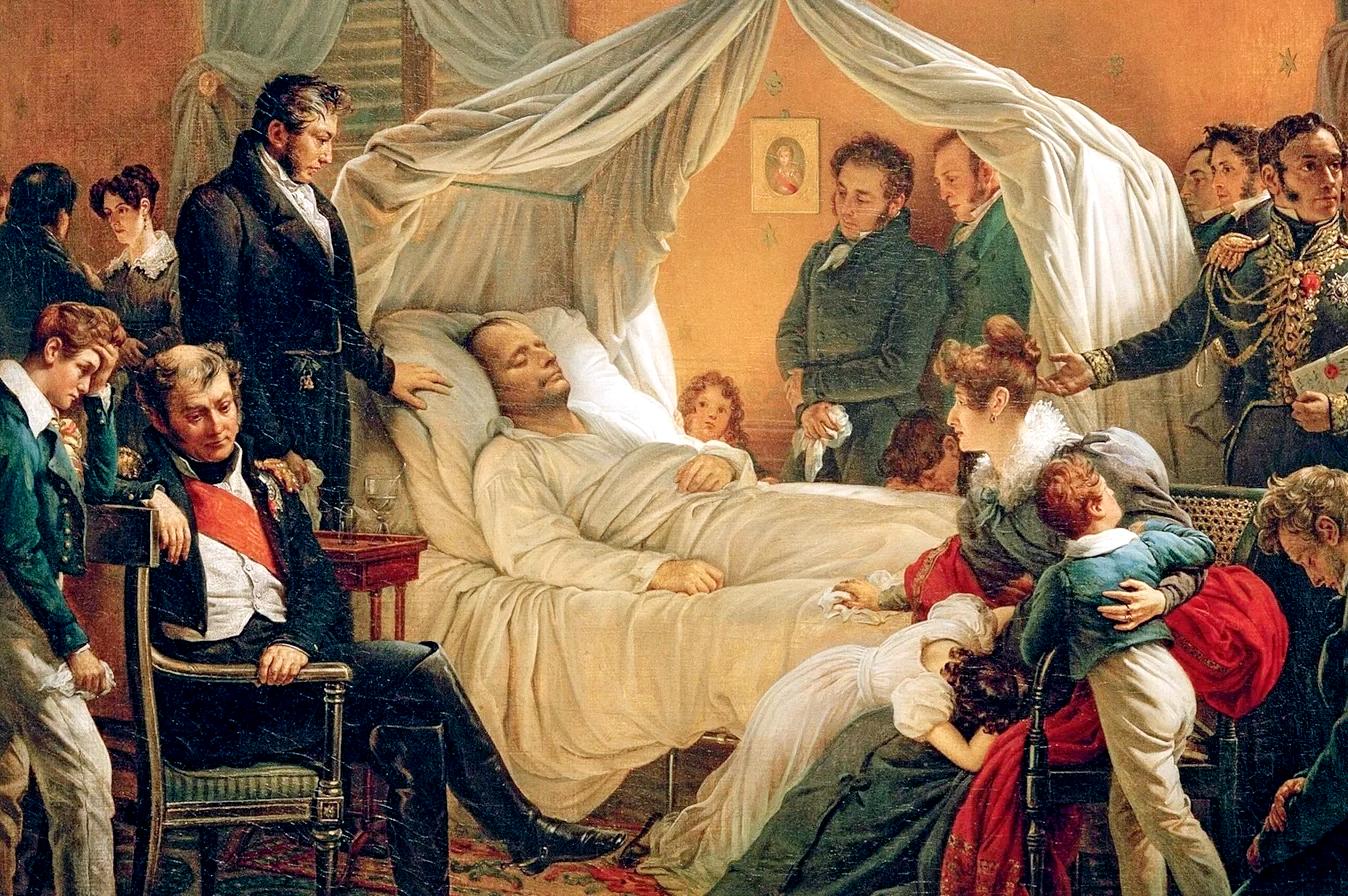
Figure 1.--Here we see a painting depicting Napoleon's death bed. We are not sure who all the peoople are. There were also British offuicers in attedance. Artist Charles de Steuben was an actual witness at Napoleon's deathbed (May 1821). |


|
It is said with some justifiction that history is written by the victors. That is gebnerally true in the short term, but not in the longer term. Napoleon throughout his reign and in the immediuate afterathn of hisdemise was depicted as a monster by the European monarchies. The Allies after their vicory at Waterloo continued this practice. But today thethe historical assessment of Napoleon is very mixed and the French in particular still debate the historical role of Napoleon. The classic historical question is if Napoelon ended the French Revolution or was a continuation of the Revolution. While it is probably a streach to say Napoleon is a continuation of the Revolution, a strong case can be made that he ended the Ancien Régime and the old order of Europe. Modern depictions are more even handed, but often Napoleon is included in a list of meglomanics despots like Hitler, Stalin, and Mao and a forerunner of 20th century totalitarianism. The wars with the French Republic initiated by the European monarchies were well under way several years before Napoleon emerged as first a general and ultimately the Emperor. Wars waged by monarchiests seize territory were of course nothing new to Europe. Here it is difficult to see Napoleon as a particularly evil monarch out of the ordinary in historical terms. Nor was he responsible for the execution of the King and Queen. Certainly his military and political skills cointinued the conflict btween European nations to an unusually long periods, bring death to hundreds of thousands. But many of those wars were declared by the British and France's European foes rather than by Napoleon. A glaring sin of course was that he was not of a legitimte royal family. But that was only part of the problem. While Napoleon can be seen as a despot, it is surely true that many of the members of the coalitions that fought him supressed their people to a far greater extent that Napoleon supressed the French. It is also true that he was all to willing to use military force to impose his will on Europe, including treaties that were intolerable to the defeated countries. 【Kagan】 Here a more nuianced diplomacy might have enabled him to have been accepted by the other European powers. Napoleon's reign while bringing disastrous wars with huge costs in men and treasure, also instituted important reforms. Perhaps the most important was the legal reforms of the Code Napoleon. And this is a why some authors place Napoleon in a different plane than the megolmaniac dictators of the 20th century. We note none of the inhumanity of mass murder as conducted by Hitler, Stalin, and Mao--although Napoleon does not seem to have been greatly concerned with the casualties resulting from his endless wars. Napoleon had no sympathy for democracy, but perhaps most significanty he believed in the rule of law. Some historians insist that even as Emperor, he was not an absolutist and that that there were constitutionanal checks on his power. Ths is worth considering, although there seems to have been fewer checks on his power than mfany of the European monarchies, rxceopt of course the Russian Tsar. Historians have argued if Napoleon represented the end of Revolution or its continuation. Napoleon certainly believed in civic equality. One author insists that unlike the Bourbons, he saw soverignity as flowing from the people enshirned with the principles of the Revolution. 【Englund】 Perhaps, but he did not rule like that. Under Napoleon there were real electiions in the annexed terrritories. 【Crook and Dunne】 Elections were held in France itself, but the nature of thoise elections is a matter of histiorical dispute. 【Crook】
Crook, Malcomn. "Voting under Napoleon. An autopsy of electoral practice during the First Empire, based on a prefectural enquiry into the cantonal elections held in the Summer of 1813," Annales historiques de la Révolution française Vol. 382, Issue 4 (October 2015), pp. 103-22.
Crook, Malcolm and John Dune. "The first European elections? Voting and Imperial state-building under Napoleon, 1802–1813," The Historical Journal Publishd on line (August 14, 2014).
Englund, Steven. Napoleon: A Political Life (Scribner, 2004), 575p.
Kagan, Frederick. The End of the Old Order: Napoleon and Europe, 1801-05 (2006).
Navigate the Boys' Historical Clothing Web Site royal pages:
[Return to the Main Napoleon page]
[Return to the Main French royal pages]
[Return to the Main Bonaparte royal pages]
[Austria]
[Belgium]
[Denmark]
[Germany]
[Italy]
[Luxenburg]
[Monaco]
[Netherlands]
[Norway]
[Romania]
[Russia]
[Spain]
[United Kingdom]
